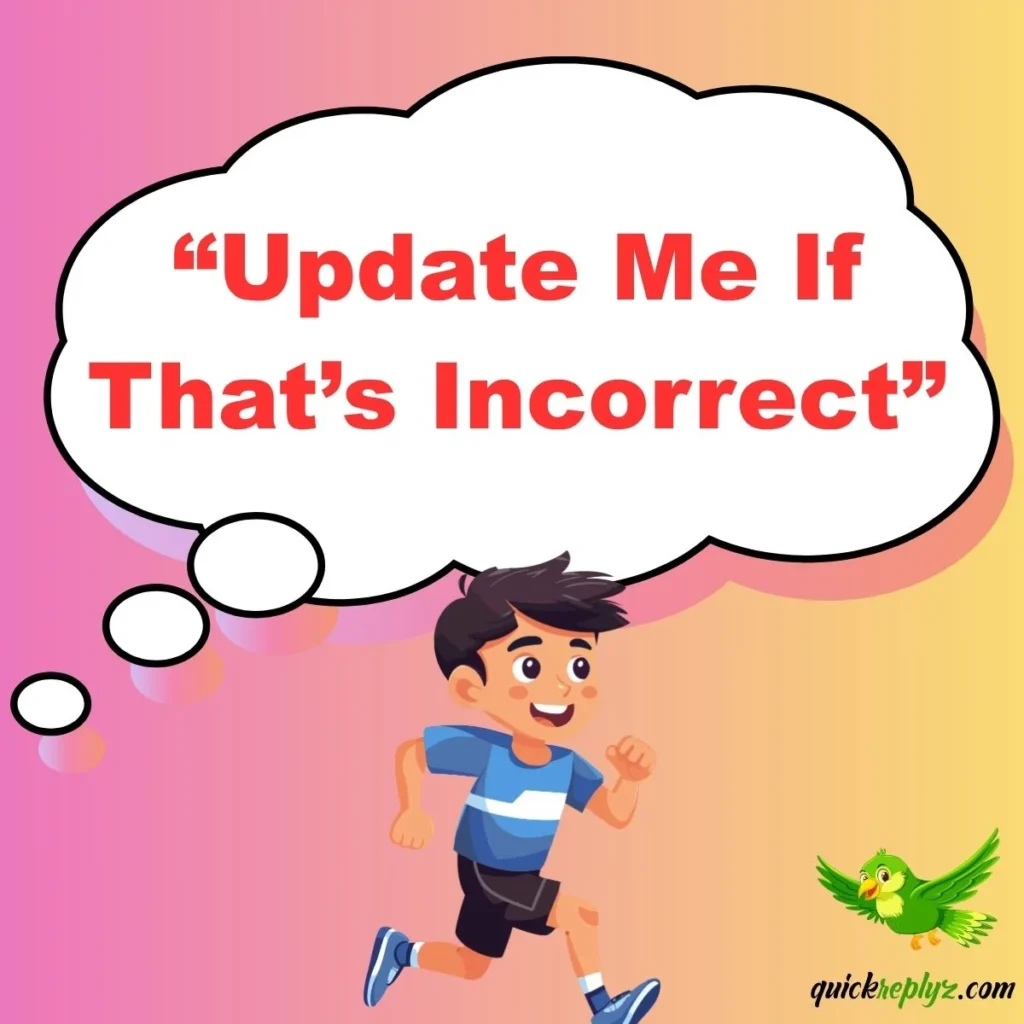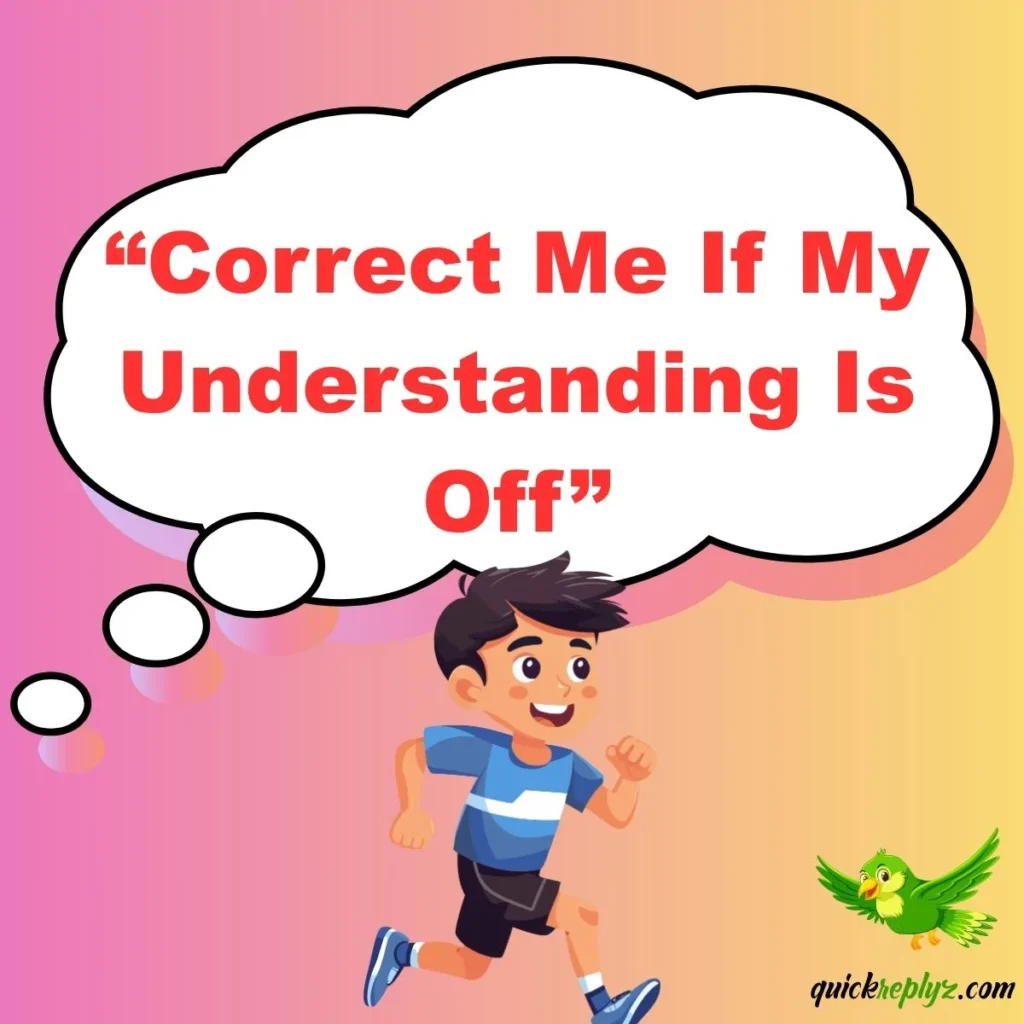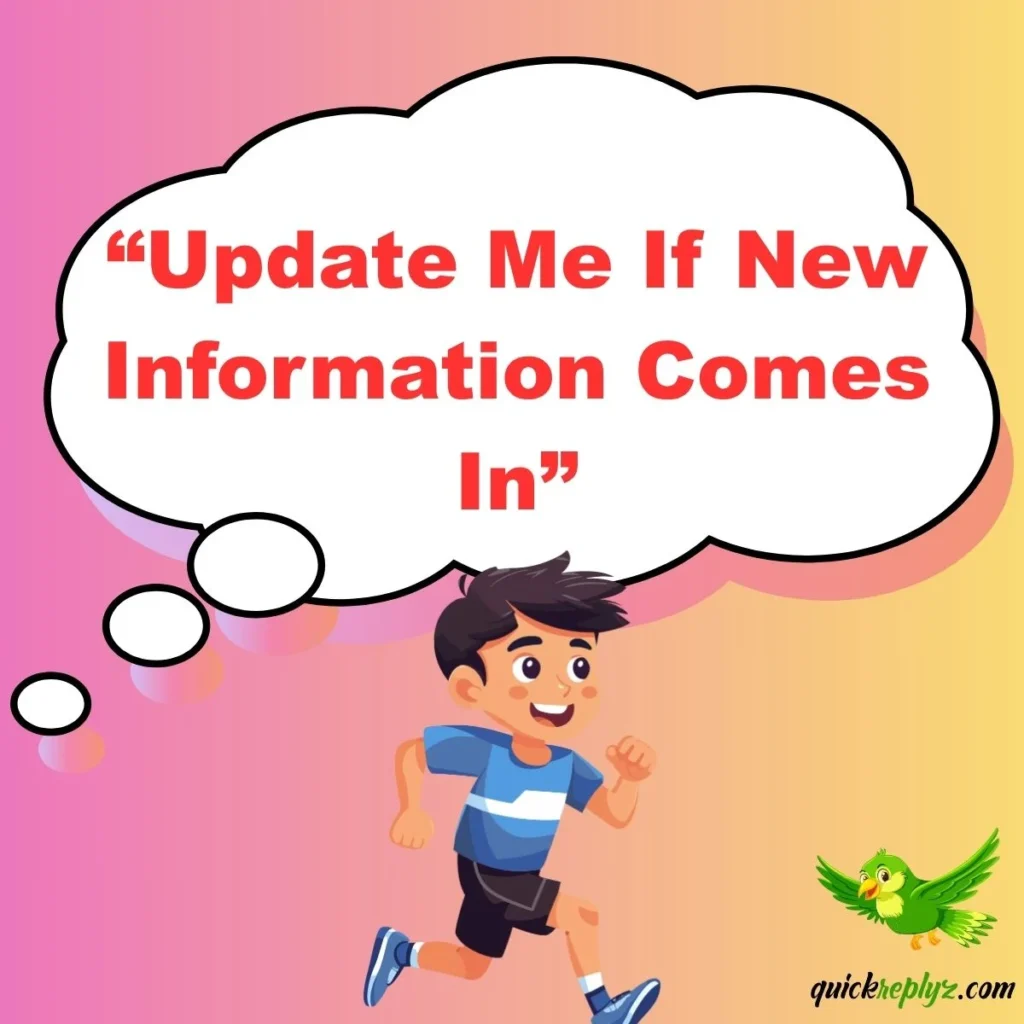Communication is all about finding the right words for the right moment. Whether you’re writing an email, sending a text, or leading a project, knowing alternative ways to say “let me know if otherwise” can make your tone warmer, more professional, or more engaging. This phrase is often used to invite corrections, feedback, or clarifications, but repeating the same wording can feel stale.
In this article, we’ll explore 30 unique, professional, and casual variations of this phrase. Each one comes with a short story-style explanation, a practical example, and the best use case so you’ll know exactly when to use it. These are perfect for workplace communication, business correspondence, academic writing, or casual texting — and they’ll help you sound clear, confident, and approachable.
Another or Professional Way to Says “Let Me Know If Otherwise”
- Please Correct Me If I’m Wrong
- Let Me Know If That’s Not the Case
- Tell Me If I Missed Anything
- Inform Me If There’s a Change
- Reach Out If Something’s Different
- Let Me Know If This Doesn’t Work
- Alert Me If Anything Changes
- Notify Me If There’s an Issue
- Let Me Know If We’re Not on the Same Page
- Update Me If That’s Incorrect
- Tell Me If I Got That Wrong
- Ping Me If Plans Change
- Reach Out If You See It Differently
- Let Me Know If You Disagree
- Correct Me If My Understanding Is Off
- Inform Me If There’s Another View
- Message Me If I’m Mistaken
- Contact Me If This Isn’t Right
- Advise Me If the Details Differ
- Let Me Know If Your Experience Differs
- Speak Up If This Isn’t Accurate
- Email Me If You Spot an Error
- Let Me Know If You See It Differently
- Reach Out If Something Feels Off
- Update Me If New Information Comes In
- Let Me Know If I’ve Overlooked Something
- Inform Me If I’m Off Track
- Correct Me If the Facts Have Changed
- Tell Me If I’m Missing Key Details
- Reach Out If You Have Other Information
1. “Please Correct Me If I’m Wrong”
Sometimes, you need a polite way to show you’re open to correction. This phrase works beautifully in professional settings where accuracy matters. Imagine you’re in a project meeting and you recap the details — this phrase leaves the door open for others to speak up if something’s off.
Example:
“We’ll be starting the marketing campaign next Monday, please correct me if I’m wrong.”
Best Use:
Use in work emails, team discussions, or reports when you want to remain accurate but humble.
2. “Let Me Know If That’s Not the Case”
This phrase is direct and leaves no room for confusion. I once used this in a client email after summarizing our meeting notes, and it instantly invited clarification without sounding confrontational.
Example:
“The software update will roll out by Friday — let me know if that’s not the case.”
Best Use:
Perfect for business communication where confirming facts is important.
3. “Tell Me If I Missed Anything”
A friendly and humble phrase that encourages others to fill in any gaps. I remember using this after a group brainstorming session, and it made teammates comfortable enough to point out missed points.
Example:
“Here’s the meeting summary, tell me if I missed anything.”
Best Use:
Great for meeting recaps, collaborative projects, and teamwork environments.
4. “Inform Me If There’s a Change”
This one works well in situations with timelines and evolving circumstances. For example, when managing a shipping schedule, it shows you expect updates if anything changes.
Example:
“We’re set for delivery on Thursday — inform me if there’s a change.”
Best Use:
Ideal for logistics, scheduling, and client communications.
5. “Reach Out If Something’s Different”

This phrase has a friendly, approachable tone. I once used it in a customer service follow-up email, and it helped the client feel they could easily ask questions.
Example:
“We’ll process the order as agreed — reach out if something’s different.”
Best Use:
Great for client relations, customer service, and casual work settings.
6. “Let Me Know If This Doesn’t Work”
Perfect for when proposing plans or schedules. In one freelance project, I used this to suggest a timeline and it opened the door for negotiation.
Example:
“I’ve set the meeting for 2 PM — let me know if this doesn’t work.”
Best Use:
Best for scheduling and collaboration.
7. “Alert Me If Anything Changes”
This phrase works in urgent or time-sensitive scenarios. Once, while organizing an event, I used it to ensure vendors updated me immediately if their plans shifted.
Example:
“We’re still on for 7 PM — alert me if anything changes.”
Best Use:
Ideal for events, deadlines, and critical operations.
8. “Notify Me If There’s an Issue”
Professional and clear, this phrase keeps communication efficient. I used this when coordinating with IT for a system update, ensuring they’d contact me at the first sign of trouble.
Example:
“We’ll begin maintenance tonight — notify me if there’s an issue.”
Best Use:
Best in technical, operational, or managerial contexts.
9. “Let Me Know If We’re Not on the Same Page”
A relationship-builder, this phrase is perfect when you want to ensure mutual understanding. In a remote work project, I used it to prevent misunderstandings about tasks.
Example:
“Here’s the outline — let me know if we’re not on the same page.”
Best Use:
Great for collaborative work and long-term projects.
10. “Update Me If That’s Incorrect”

Direct and precise, it’s great for confirming facts. I’ve used it in financial reports where accuracy was critical.
Example:
“The payment was processed on Monday — update me if that’s incorrect.”
Best Use:
Perfect for data verification and formal communication.
11. “Tell Me If I Got That Wrong”
This phrase has a conversational yet respectful tone. I once used it while reviewing a client’s proposal draft. It made them feel comfortable correcting me without hesitation, which helped avoid a costly misunderstanding later. It works especially well when you want to be open about your own fallibility without sounding unsure.
Example:
“The campaign starts on the 15th, tell me if I got that wrong.”
Best Use:
Use in team collaborations, proposal reviews, or when summarizing details that may need verification.
12. “Ping Me If Plans Change”
Casual and modern, this phrase fits perfectly in quick digital communication. I used it in a Slack channel when coordinating a last-minute photo shoot. Everyone instantly knew they could send me a quick message if something shifted.
Example:
“We’ll meet at the lobby at 10 AM — ping me if plans change.”
Best Use:
Best for informal work chats, instant messaging, and fast-moving project updates.
13. “Reach Out If You See It Differently”
This variation invites discussion rather than simple correction. I used it once in a brainstorming meeting to encourage creative alternatives to my suggestion. It not only welcomed feedback but also sparked new ideas.
Example:
“I believe this is the best route — reach out if you see it differently.”
Best Use:
Ideal in collaborative environments where multiple perspectives are valued.
14. “Let Me Know If You Disagree”
Straightforward and bold, this phrase is perfect when decisions are being finalized but you still want to allow space for objections. I once used it before sending a project live, ensuring the team could voice last-minute concerns.
Example:
“We’ll proceed with this layout — let me know if you disagree.”
Best Use:
Best in decision-making moments where clear consensus is important.
15. “Correct Me If My Understanding Is Off”

This phrase signals humility and openness to correction. I used it in a cross-department meeting to confirm a process I wasn’t entirely familiar with. It helped me gain accurate information without sounding uninformed.
Example:
“We’ll need three approvals before launch — correct me if my understanding is off.”
Best Use:
Great in situations where processes or procedures are complex.
16. “Inform Me If There’s Another View”
Professional and diplomatic, this phrase acknowledges that multiple perspectives may exist. I used it during a policy discussion to ensure we considered alternative opinions before finalizing the draft.
Example:
“We’ll adopt this approach — inform me if there’s another view.”
Best Use:
Perfect for decision-making in corporate, political, or academic settings.
17. “Message Me If I’m Mistaken”
Casual yet polite, this phrase works well in day-to-day exchanges. I once sent it to a colleague when confirming a shared deadline, and they quickly corrected a small date mix-up.
Example:
“I’ve marked your presentation for Tuesday — message me if I’m mistaken.”
Best Use:
Best for informal work chats, quick texts, and casual corrections.
18. “Contact Me If This Isn’t Right”
Direct and formal, this works well when confirming official or sensitive information. I used it in a legal document review to ensure accuracy before submission.
Example:
“We have your registered address as 45 Oak Street — contact me if this isn’t right.”
Best Use:
Best in legal, financial, or contractual correspondence.
19. “Advise Me If the Details Differ”
This is a refined, professional choice for formal emails. I once used it in a project scope document, signaling that I was open to corrections before finalizing the contract.
Example:
“The contract reflects our meeting notes — advise me if the details differ.”
Best Use:
Ideal for business contracts, official memos, and project documentation.
20. “Let Me Know If Your Experience Differs”

This phrase is perfect when seeking input based on personal or professional experience. In a training session, I used it to encourage participants to share their own approaches.
Example:
“This method has worked for us — let me know if your experience differs.”
Best Use:
Excellent in workshops, mentorship, and research discussions.
Also Read This :30 Best Responses to Happy New Year
21. “Speak Up If This Isn’t Accurate”
Encouraging and assertive, this phrase invites open dialogue. I once used it when presenting survey results, ensuring the audience could point out any errors.
Example:
“These figures are from our latest report — speak up if this isn’t accurate.”
Best Use:
Great for presentations, team briefings, and report reviews.
22. “Email Me If You Spot an Error”
This phrase sets a clear channel for communication. I’ve used it in newsletters and formal updates to give readers a direct way to provide feedback.
Example:
“Please review the attached proposal — email me if you spot an error.”
Best Use:
Ideal for written documents, proposals, and distributed reports.
23. “Let Me Know If You See It Differently”
This variation balances openness with respect. I used it during a strategy session to make sure everyone had the chance to share alternative ideas.
Example:
“I think this is the right approach — let me know if you see it differently.”
Best Use:
Perfect for group problem-solving and strategic discussions.
24. “Reach Out If Something Feels Off”
This phrase is casual yet caring. I once used it in a mental health advocacy email to show support while discussing sensitive topics.
Example:
“We’ll proceed with these plans — reach out if something feels off.”
Best Use:
Best for personal communication, wellness initiatives, and supportive work culture.
25. “Update Me If New Information Comes In”

Proactive and professional, this phrase shows you want to stay informed. I used it in a market research project to ensure I had the latest data.
Example:
“We’ll work with these numbers — update me if new information comes in.”
Best Use:
Excellent for ongoing projects, research, and evolving situations.
26. “Let Me Know If I’ve Overlooked Something”
This phrase conveys humility and thoroughness. I used it in a policy review session, encouraging others to spot missing points.
Example:
“Here’s the checklist — let me know if I’ve overlooked something.”
Best Use:
Best for detailed tasks, checklists, and process reviews.
27. “Inform Me If I’m Off Track”
This phrase is great for mentorship or learning situations. I once used it while learning a new software tool, showing I was eager to be corrected.
Example:
“I think I’m following the right steps — inform me if I’m off track.”
Best Use:
Perfect for training, guidance, and personal development.
28. “Correct Me If the Facts Have Changed”
Ideal when working with time-sensitive data, this phrase invites updates. I’ve used it in press release preparation to ensure all statistics were current.
Example:
“These figures are from last quarter — correct me if the facts have changed.”
Best Use:
Excellent for reporting, analytics, and official statements.
29. “Tell Me If I’m Missing Key Details”
This phrase shows that you value completeness. I used it in a funding proposal to ensure every requirement was addressed.
Example:
“Here’s the draft — tell me if I’m missing key details.”
Best Use:
Perfect for proposals, documentation, and collaborative writing.
30. “Reach Out If You Have Other Information”
Open-ended and welcoming, this phrase encourages ongoing dialogue. I once used it in a volunteer coordination email, which led to valuable input from participants.
Example:
“We’ll move forward with this plan — reach out if you have other information.”
Best Use:
Best for community projects, networking, and teamwork.
Conclusion
Whether you’re sending a formal email or a casual text, having multiple ways to say “let me know if otherwise” ensures your communication stays fresh, polite, and adaptable to different contexts. These 30 alternatives are not only polite but also encourage open, two-way communication — which is essential for professional and personal success.
FAQs
Q1: Why not just use “let me know if otherwise” every time?
Because variety keeps communication fresh and better suited to different contexts and relationships.
Q2: Which phrases are best for formal communication?
Phrases like “Advise me if the details differ” and “Inform me if there’s another view” are perfect for formal settings.
Q3: Can I use these in text messages?
Yes — casual ones like “Ping me if plans change” or “Message me if I’m mistaken” work great in texts.
Q4: Are these alternatives polite?
Yes — each phrase is crafted to be professional and respectful while still inviting feedback.
Julianna Sanders is a creative contributor at QuickReplyz.com who enjoys making communication simple and stress-free. She writes practical replies, messages, and captions that users can instantly apply in real-life conversations. Her goal is to deliver helpful, easy-to-use content for everyone.

